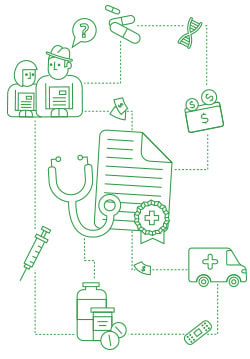Buying a pharmacy should be treated like any other big investment or commitment you make in life.

You’ll need to consider many factors like commitment, compatibility and what it is going to cost you financially and emotionally. This is why doing your homework is so important to help you understand what type of pharmacy you are buying. By asking the right questions, you will survive due diligence and make the right business purchase decision.
‘Information is not knowledge’
A due diligence gives you access to all the information you need to assist you in purchasing a business; however, as Albert Einstein said, ‘Information is not knowledge’. It is how you analyse and use the information to assess the value of the business and the risks associated with buying it.
As an accountant, I’ve
undertaken many due diligences and often enough I’ve seen many deals fall through for different reasons.

The due diligence process is a vital part of the purchase process as it gives you access to important and confidential information of the business that it easily available from the vendor. This information is not limited to just financial data; other information you should review in this process includes lease agreements and staff rosters, and non-financial data such as trends in customer numbers and script numbers, types of drugs dispensed and other matters.
When reviewing the financial information, the four key areas of focus and where the common issues lie are:
-
1. Sales:
a. Sales mix – Understanding where the income is coming from is crucial in understanding the pharmacy business. Commonly, income is reported as retail and dispensary; however, within the dispensary, this can be nursing home contract sales, compounding sales and medical centre script sales. Knowing the source of the income will indicate the risks associated with the pharmacy.
For example, when a pharmacy has the majority of its dispensary sales being derived from nursing home contracts, how secure are those contracts once you take over? When does the term end and what is the likelihood you will be able to renew the contract?
-
b. Trends – Increase/decrease in sales trends could be due to a seasonal or industry-specific change. For example, high cost drugs have inflated sales figures; however, they do quite the opposite to the gross margin of pharmacies, hence misrepresenting the comparative analysis as well as distorting the pharmacy’s true margin.
Tip: Remove the sales of HCD and the associated cost to provide a clearer and more accurate measure of gross profit and margin.
-
c. Professional Services Income – Does the pharmacy derive its fair share of this and where is it recorded in the profit and loss statement? If PSI is low, this could be an opportunity. If PSI is simply being recorded as part of sales, this will result in overstating the gross profit margin being reported
-
2. Gross Profit (GP) and Margin:
GP$ pays your expenses, hence it is important to get this right. Understand the pharmacy model and check that the margins are in line with that model. Many times, I’ve reviewed various Point of Sale (POS) reports which do not agree with the margin reported on the financial statements. This raises questions on the reliability of the data and can cause doubt and lack of confidence in the integrity of the financial statements. Remember: The financial statements drive the valuation of the business and having confirmation from another source, such as the POS reports, gives you greater confidence. Rest assured though, there are other ways around to confirm the GP. My key message here is not to be afraid to ask the hard questions and dig a bit further.
-
3. Rent:
A major running cost and a very difficult cost to control. It is always dependent on the location of the pharmacy, the landlord and the lease agreement. Always review the lease to confirm the term of the lease. The remaining term of the lease can affect your borrowing ability or cause added stress in negotiating a new lease. Reviewing the lease will also provide detail on the method and timing of the rent increase and disclose if there are any hidden costs such as clauses which require tenants to return the premises to its original condition at their own expense.
-
4. Wages:
Every pharmacy is different, but wages will always be one of the major costs in running a pharmacy. Take the time to make sure you get this number right. Look out for unusual/one-off payments such as termination pay or excess/missing wages paid to owners or family members — owners may not pay themselves a wage and instead could be taking drawings from the business.
Tip: Review staff rosters to confirm the wage cost and efficient utilisation of staff.
Look out for:
Government charges such as payroll tax, are an added tax for the cost of wages.
This should be looked at closely if you already own a pharmacy as the addition of a new pharmacy could push you over the threshold. A further key issue is that you need to enquire to ensure staff are being paid correctly under the award. You should also be wary of rosters provided by brokers for the same reason — are they including wages at correct award rates? If the ‘suggested roster’ is different from the current store roster – why?
In with the new, out with the old
Consider whether you are reviewing the most recent data as the last financial year may not be telling you the true story. Comparing last year’s results to the current year can assist you in tracking trends in the business; however, current data/financial results give you insight on what is happening today in the business.
Tip: If you are in-between reporting periods, ask for YTD management accounts or, at a minimum, BAS reports.
It is imperative that a due diligence is undertaken before signing on the dotted line. Being prepared for the due diligence ensures the process can run smoothly and quickly. Actually, insisting on having a due diligence done will also help ensure you don’t get buyer’s remorse because of the reality turning out to be quite different.
Survival Kit:



-
Use a checklist to make sure you thoroughly investigate all aspects of the business sale.
An accountant or business advisor would have these already -
Use the right people.
A good start would be to find an experienced pharmacy specialised accountant or business advisor. From there, they will refer you to other professionals such as a solicitor, finance broker and valuer specialising in the industry and direct the traffic for you. -
Get intimate.
Spend time with the vendor in the store or sit outside and simply observe the pharmacy — this gives you an idea what a day in the pharmacy is like and the vibe of the surrounding to see if this is the right pharmacy for you. You should ensure you play your part in the due diligence. There are various factors outside of the numbers that you should be investigating, such as existing and possible new competition in the area, what’s happening in relation to any developments, key relationships with doctors and nursing homes, and other factors. It is hopefully going to be your pharmacy so be sure to be part of the action
If you need further assistance regarding any of the content discussed in this article, get in contact with your local RSM Pharmacy Business Expert.
This article was originally published in Gold Cross Products & Services Pty Ltd • ITK Issue 67 • August–September 2019
